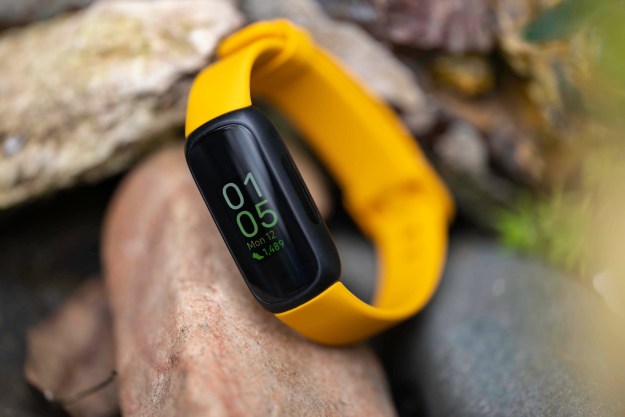
Besides running, the Surge will be ideal for anyone that’s undergoing cross-training or other types of cardio workouts, both in the gym and outside. Users will be able to view metrics specific to each type of training and track the intensity of each workout.
Regarding the heart rate monitoring function, the Surge does not require the use of chest straps to track heart rate while exercising. Similar to other Fitbit devices, the Surge will track information that includes calories burned, distance traveled, steps taken and floors climbed as well as provide a gauge of a user’s typical activity level throughout the day. In addition, Fitbit is including a sleep tracker and silent vibrating alarm to wake up users in the morning.
Interestingly, the Surge can also link up with your smartphone (likely supporting iOS and Android at launch) in order to display notifications for incoming texts or calls. The Surge can also be used to control volume and track selections when listening to music, ideal for anyone that likes to run with their smartphone or compatible MP3 player.
At launch, the device will be available in three colors, black, slate and tangerine. At this time, there’s no information related to how water resistant the Surge will be, but it should withstand sweat or rain if it’s recommended for use during outdoor workouts. Similar to other Fitbit devices, the Surge will wirelessly connect to a computer to transmit tracking data.
Of course, the Surge will be specifically marketed to consumers that are looking for an exercise tracker rather than just a regular fitness tracker. Alternatively, the Fitbit Charge and Charge HR wristband wearables will be available this holiday season for anyone that wants to replace a Fitbit Force or step up from the Fitbit Flex. The Force was pulled from shelves during early 2014 due to skin irritation issues from the nickel used in manufacturing the device.
The Fitbit Charge will be fairly identical to the Force in the feature set, basically allowing users to get smartphone notifications on the wearable’s LED screen. However, the Fitbit Charge HR will include heart rate monitoring as an added feature, perhaps ideal for an older demographic of users that wants to keep a closer eye on their heart rate. No prices have been confirmed for either wearable, although it’s likely that the Charge will be around the same $130 MSRP as the Fitbit Force. The company will also continue to sell other fitness devices that include the Fitbit Flex, the Fitbit One and the Fitbit Zip.
Editors' Recommendations
- The 4 best Whoop alternatives in 2024
- Fitbit Sense 2, Fitbit Charge 6 just got handsome price cuts
- 5 smartwatches you should buy instead of the Google Pixel Watch 2
- Don’t Miss These Fitbit Deals on the Sense 2, Charge 6, and Versa 4
- The best Fitbit devices in 2023: 6 best watches and trackers

